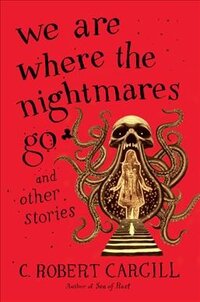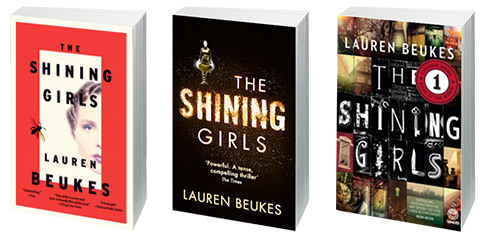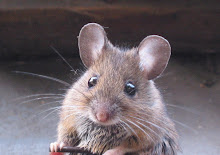HOUSTON: Tulip meets with Danni, handing over the map ("Property of Grail [sp?] Industries") for which she battled through the cornfield in exchange for someone's last known address. Danni also lays out a scenario in which Tulip could kill her husband for her but Tulip isn't down with that. The address gives her a flashback: screaming "Wait!" in an alleyway after a fleeing car, an alarm blaring. In the now, she tells Danni that was the day when it all went bad for her and Jesse. And now someone's got to pay. After Tulip leaves, Danni drives to a warehouse and slips into a snuff film festival (we don't see anything but hear screams and power tools). She hands the map to a white-suited man in the audience, saying that she told him her girl was good.
ANNVILLE: Sheriff Root is interviewing those two weird dudes in their motel room. They say that they're after something horrible that got lose, and they're deep undercover, and he's to leave them alone. "We'l call if we need anything." Sheriff Root is shaken by imagining what horrible thing is on the prowl in his town. After he leaves, they start to arm themselves with all kinds of weaponry. "No surprises" this time.
Emily stops by the brain-damaged girl's house [Tracy? is that her name?]. Her mother is amazed that Tracy's eyes are open and feels badly that she was so rude to the preacher when he told her something was going to change. The only thing that has changed is that the girl's eyes are open but still, to her mother, different is better. In another part of town, Donnie speaks to his son en route to the school bus. The boy apologizes for going to the preacher. Donnie says that "grownups are complicated ... I love your mom," deeming explaining pain-sex games too difficult at this point. His son says that he beat up a kid at school who had been talking about the funny sound Donnie made when Jesse broke his arm. Donnie's all, good - but when the bus pulls up, all the kids are like "It's the bunny-man!" and start squeaking and squealing at him.
Emily finds Cassidy at the church and instructs him to take the recently delivered coffin (whatsisname who cut his own heart out) to the crematorium. When the vampire goes to get the keys to the van, he finds Jesse skulking in the kitchen. Jesse: "I wanna show you somethin'." What he does is demonstrates his power on Cassidy, making him hop, confess a secret, shadow-box, sing Johnny Cash etc. They learn that the power is limited to what the person can actually do: when he tells Cassidy to fly, the vampire throws himself at the wall but is, in fact, unable to fly. Cassidy is thrilled but Jesse is pretty close to thinking he's crazy. "It might feel like a curse ... but it doesn't have to be. Someone like you, with something like this. I mean, come on, padre. You just imagine the possibilities here."
On her way back to Annville from Houston, Tulip gets pulled over for speeding. She talks her way out of it. That's about it.
QUINCANNON MEAT AND POWER. Odin Quincannon likes to listen to the slaughterhouse over the intercom while he has his lunch. Yeesh. Donnie reads him a letter from some company ("Green Acres") who is either horning in on QMP's territory or wants to work together. Donnie's feathers are ruffled but Quincannon doesn't seem too fashed at this point. Not really sure what's going on here.
Jesse meets up with Tulip on the road in the boondocks. He tells her again that he doesn't want to get back into a life of crime and she snaps at him, "This isn't crime, preacher. This is justice." Jesse stares at her: "Carlos." And then he has the flashback she had earlier, only he's just shot a security guard in the head as the alarm blares and Carlos drives off, leaving Tulip screaming after him. "Rat-bastard, money-stealin', child-killin', life-ruinin' sonofabitch," confirms Tulip here and now, waving the address at Jesse. "Jesse, come on. Let's go kill Carlos." And just like that, he's in.
At the motel, the weird dudes are locked and loaded and ready to roll. On his way back from the crematorium, Cassidy sees them drive by in their black SUV and is all, they found me again. After the sun goes down, the dudes advance on foot towards the church. Their goals: "First the can [that coffee can], then the preacher." But they don't get very far before Cassidy roars up in the church van and runs them over. When he gets out to survey the carnage - and they are ALL messed up - he is amazed to see that they look just like the two guys he buried. "Clones," he decides. As he walks off to fetch something to clean up this mess, a light flashes; when he comes out into the church, the two dudes are there. Again. Cassidy starts beating on one of them with a croquet mallet he found in the closet, growling, "How do you keep finding me?" until the dude who is not getting beaten interrupts, saying "We're not here for you." And then they have a bit of a sit-down, saying that the preacher has something of theirs and they need to put it back.
Tulip has to stop to gas up her car. Jesse tries to tell her about what's happening with him but she's all wired, getting belligerent with another gas station patron, so he blows it off and hits the head instead. In the bathroom, he gets ambushed by a pistol-toting Donnie: "Who's the bunny in the bear trap now?" Jesse of course uses the Voice to make Donnie shove the gun in his own mouth but just before he forces the other man to pull the trigger, he sort of gives himself a little shake, realizing that he seems to be enjoying this power a little too much. He says to himself, "I get it," and tells Donnie that he can go. And when he rejoins Tulip out at the pumps, he says he's changed his mind. As he starts walking back to town, he tells her that he's staying [in Annville]. She shrieks, "Well, I ain't leavin' without you!" but he just shrugs and keeps walking.
Back at the church, the two weird dudes tell Cassidy that if they don't collect what's inside the preacher, death and destruction will follow. He questions why they want that power - military, economics, psychosexual mind control - but they're like no, it's not to be used at all. They tell Cassidy they're from the government but when he, being a good conspiracy theorist, starts rattling off agencies and acronyms, they break in: "We're from Heaven." Cassidy: "I see. Right." He tells them that they're going about this the wrong way, hunting down Jesse, but if they just take a step back, he'll talk to his best mate and convince him of their mission. I can't tell if he's playing them or not.
As the episode ends, Jesse and Emily are the only attendees at the funeral for Whatsisname (who cut out his own heart). The camera pulls back as the preacher gives the reading and the valve on a standpipe out in a nearby field snaps open with a hiss. What does that mean?
Previously on Preacher /
next time on Preacher










